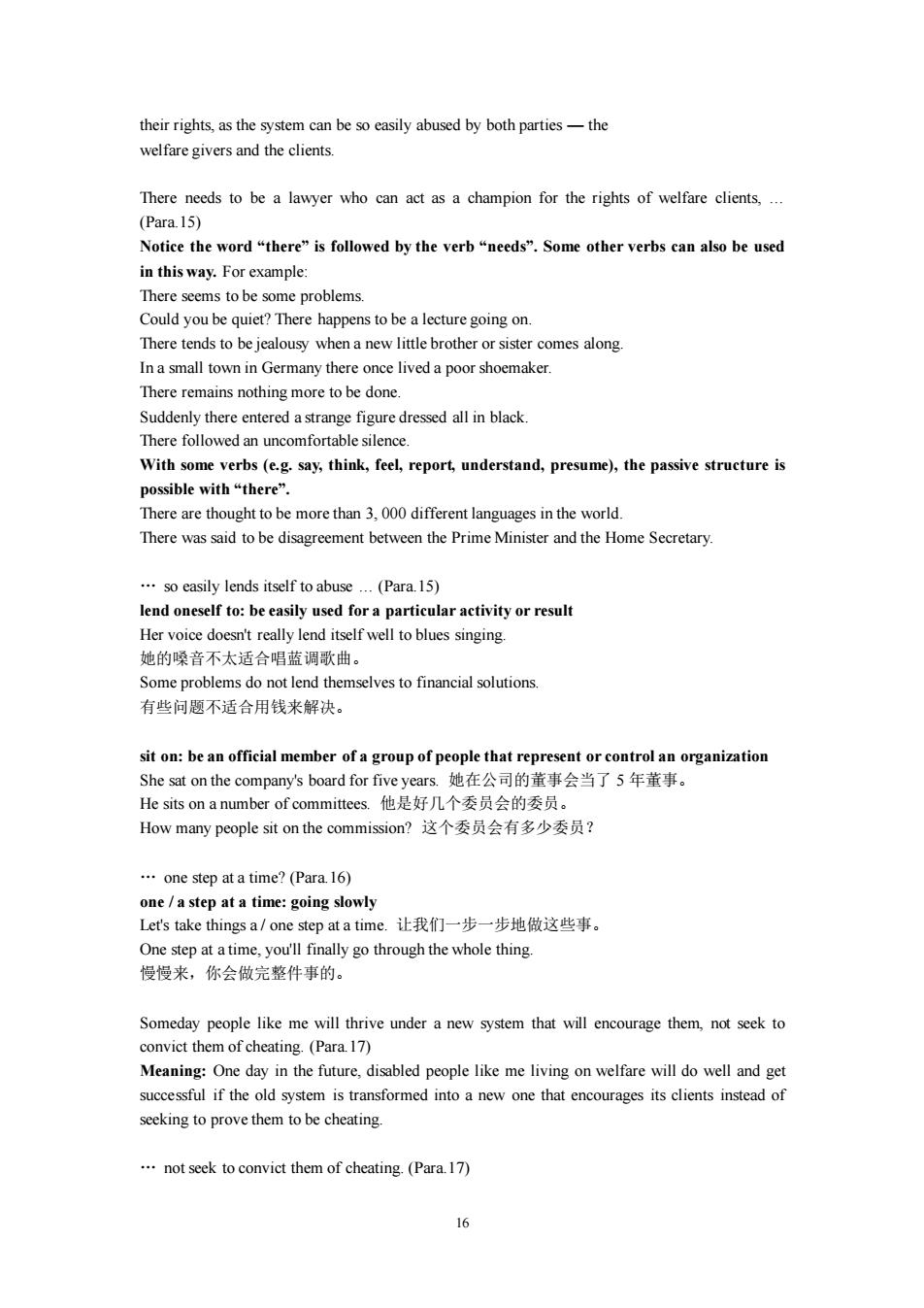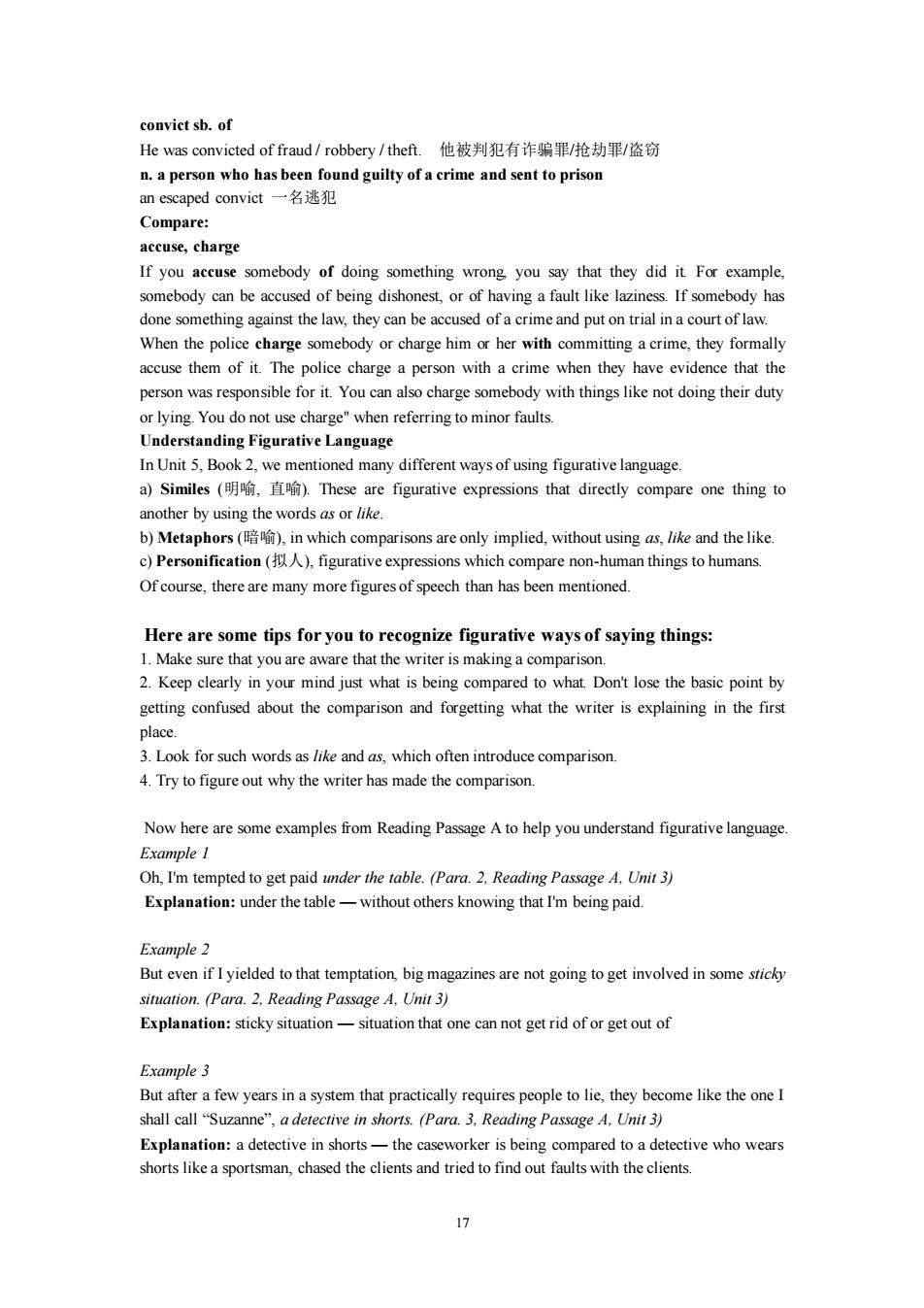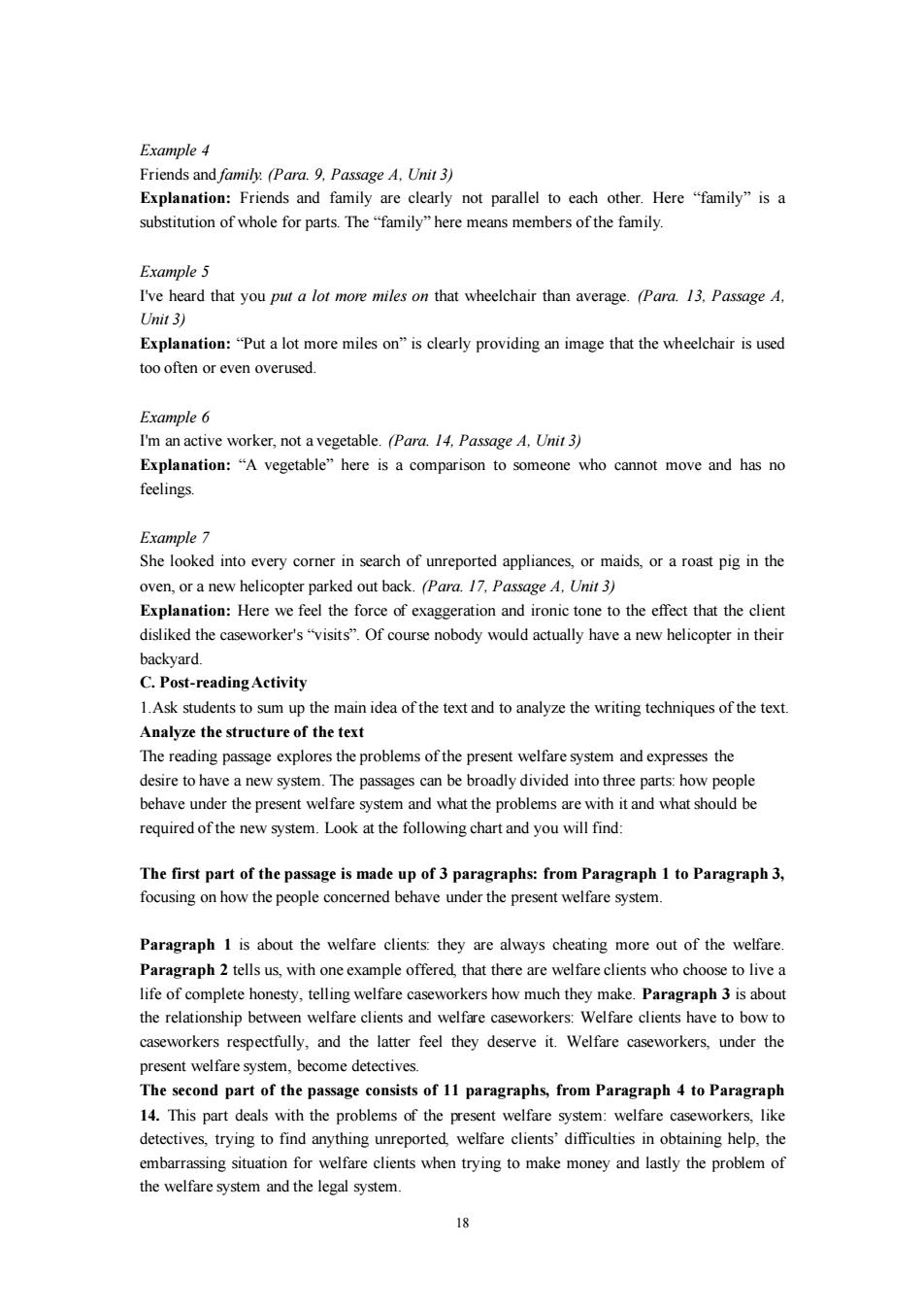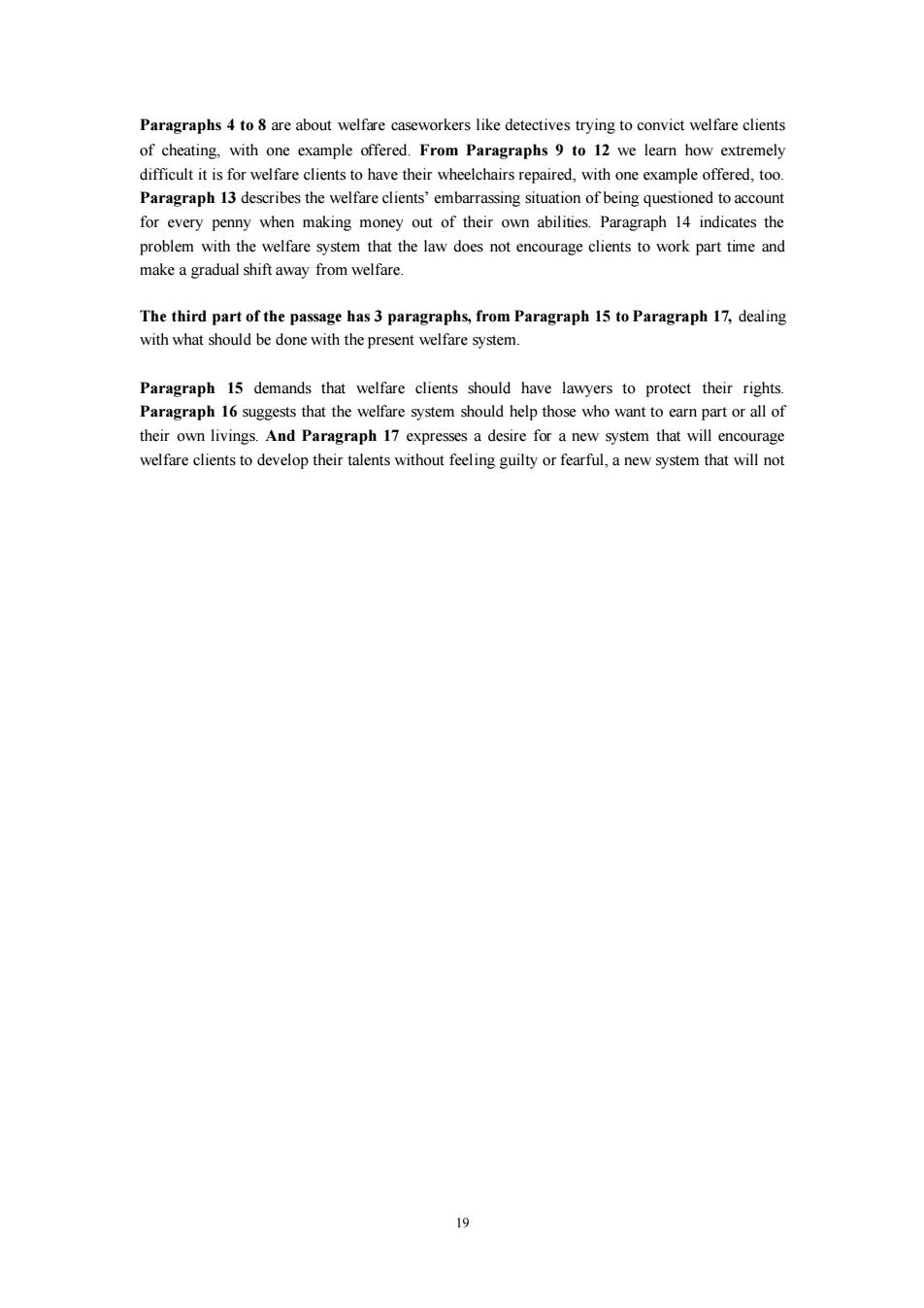
their rights, as the system can be so easily abused by both parties-thewelfare givers and the clients.Thereneedstobealawyerwhocan act as a championfortherightsof welfareclients,..(Para.15)Notice the word "there"”is followed by the verb“"needs". Some other verbs can also be usedin this way.For example:ThereseemstobesomeproblemsCould you be quiet? There happens to be a lecture going on.There tends to be jealousy when a new little brother or sister comes alongIn a small town in Germany thereonce lived a poor shoemaker.There remains nothing more to be done.Suddenly there entered a strange figure dressed all in black.Therefollowed anuncomfortablesilence.With some verbs (e.g. say, think, feel, report, understand, presume), the passive structure ispossible with“there".Therearethoughttobemorethan3,O00differentlanguages intheworld.Therewas saidtobedisagreementbetweenthePrime MinisterandtheHome Secretary:so easily lends itself to abuse ... (Para.15)lend oneself to:be easily used for a particular activityor resultHer voice doesn't really lend itself well to blues singing.她的噪音不太适合唱蓝调歌曲。Someproblems donot lend themselves tofinancial solutions有些问题不适合用钱来解决。sit on: be an official member of a group of people that represent or control an organizationShesatonthecompany'sboardforfiveyears.她在公司的董事会当了5年董事。Hesitsonanumberofcommittees.他是好几个委员会的委员。Howmanypeoplesitonthecommission?这个委员会有多少委员?... one step at a time? (Para.16)one/a step at a time:going slowlyLet's takethings a/onestepatatime.让我们一步一步地做这些事。One step at a time, you'll finally go through the whole thing.慢慢来,你会做完整件事的。Someday people like me will thrive under a new system that will encourage them, not seek toconvict them of cheating. (Para.17)Meaning:One day in the future, disabled people likeme living on welfare will dowell and getsuccessful if the old system is transformed into a new one that encourages its clients instead ofseekingtoprovethemtobecheating.**not seek to convict them of cheating.(Para.17)16
16 their rights, as the system can be so easily abused by both parties — the welfare givers and the clients. There needs to be a lawyer who can act as a champion for the rights of welfare clients, . (Para.15) Notice the word “there” is followed by the verb “needs”. Some other verbs can also be used in this way. For example: There seems to be some problems. Could you be quiet? There happens to be a lecture going on. There tends to be jealousy when a new little brother or sister comes along. In a small town in Germany there once lived a poor shoemaker. There remains nothing more to be done. Suddenly there entered a strange figure dressed all in black. There followed an uncomfortable silence. With some verbs (e.g. say, think, feel, report, understand, presume), the passive structure is possible with “there”. There are thought to be more than 3, 000 different languages in the world. There was said to be disagreement between the Prime Minister and the Home Secretary. . so easily lends itself to abuse . (Para.15) lend oneself to: be easily used for a particular activity or result Her voice doesn't really lend itself well to blues singing. 她的嗓音不太适合唱蓝调歌曲。 Some problems do not lend themselves to financial solutions. 有些问题不适合用钱来解决。 sit on: be an official member of a group of people that represent or control an organization She sat on the company's board for five years. 她在公司的董事会当了 5 年董事。 He sits on a number of committees. 他是好几个委员会的委员。 How many people sit on the commission? 这个委员会有多少委员? . one step at a time? (Para.16) one / a step at a time: going slowly Let's take things a / one step at a time. 让我们一步一步地做这些事。 One step at a time, you'll finally go through the whole thing. 慢慢来,你会做完整件事的。 Someday people like me will thrive under a new system that will encourage them, not seek to convict them of cheating. (Para.17) Meaning: One day in the future, disabled people like me living on welfare will do well and get successful if the old system is transformed into a new one that encourages its clients instead of seeking to prove them to be cheating. . not seek to convict them of cheating. (Para.17)

convictsb.ofHewasconvictedoffraud/robbery/theft.他被判犯有诈骗罪/抢劫罪/盗窃n. a person who has been found guilty of a crime and sent to prisonanescapedconvict一名逃犯Compare:accuse, chargeIf you accuse somebody of doing something wrong you say that they did it For example,somebody can be accused of being dishonest, or of having a fault like laziness.If somebody hasdone something against the law, they can be accused ofa crime and put on trial in a court oflaw.Whenthepolicecharge somebodyor chargehim orherwithcommitting acrime,theyformallyaccuse them of it. The police charge a person with a crime when they have evidence that theperson was responsible for it. You can also charge somebody with things like not doing their dutyor lying. You do not use charge" when referring to minor faults.UnderstandingFigurativeLanguageIn Unit 5, Book 2, we mentioned many different ways of using figurative language.aSimiles(明喻,直喻).Thesearefigurativeexpressionsthat directlycompareone thingtoanotherbyusing the words as or like.b)Metaphors(暗),inwhichcomparisonsareonlyimplied,withoutusingas,likeandthelikec)Personification(拟人),figurativeexpressionswhichcomparenon-humanthingstohumansOf course, there are many more figures of speech than has been mentioned.Here are some tips for you to recognize figurative ways of saying things:1.Make sure that you are aware that the writer is making a comparison.2.Keep clearly in your mind just what is being compared to what Don't lose the basic point bygetting confused about the comparison and forgetting what the writer is explaining in the firstplace.3. Look for such words as like and as, which often introduce comparison.4. Try to figure out why the writer has made the comparison.Now here are some examples from Reading Passage A to help you understand figurative language.Example1Oh, I'm tempted to get paid under the table. (Para. 2, Reading Passage A, Unit 3)Explanation: under thetable-without others knowing that I'm beingpaid.Example2But even if Iyielded to that temptation big magazines are not going to get involved in some stickysituation. (Para.2, Reading Passage A, Unit 3)Explanation: sticky situation -situation that one can not get rid of or get out ofExample3But after a few years in a system that practically requires people to lie, they become like the oneIshall call “Suzanne", a detective in shorts. (Para. 3, Reading Passage A, Unit 3)Explanation:adetective in shorts-thecaseworker isbeing compared to adetective who wearsshorts like a sportsman, chased the clients and tried to find out faults with the clients.17
17 convict sb. of He was convicted of fraud / robbery / theft. 他被判犯有诈骗罪/抢劫罪/盗窃 n. a person who has been found guilty of a crime and sent to prison an escaped convict 一名逃犯 Compare: accuse, charge If you accuse somebody of doing something wrong, you say that they did it. For example, somebody can be accused of being dishonest, or of having a fault like laziness. If somebody has done something against the law, they can be accused of a crime and put on trial in a court of law. When the police charge somebody or charge him or her with committing a crime, they formally accuse them of it. The police charge a person with a crime when they have evidence that the person was responsible for it. You can also charge somebody with things like not doing their duty or lying. You do not use charge" when referring to minor faults. Understanding Figurative Language In Unit 5, Book 2, we mentioned many different ways of using figurative language. a) Similes (明喻, 直喻). These are figurative expressions that directly compare one thing to another by using the words as or like. b) Metaphors (暗喻), in which comparisons are only implied, without using as, like and the like. c) Personification (拟人), figurative expressions which compare non-human things to humans. Of course, there are many more figures of speech than has been mentioned. Here are some tips for you to recognize figurative ways of saying things: 1. Make sure that you are aware that the writer is making a comparison. 2. Keep clearly in your mind just what is being compared to what. Don't lose the basic point by getting confused about the comparison and forgetting what the writer is explaining in the first place. 3. Look for such words as like and as, which often introduce comparison. 4. Try to figure out why the writer has made the comparison. Now here are some examples from Reading Passage A to help you understand figurative language. Example 1 Oh, I'm tempted to get paid under the table. (Para. 2, Reading Passage A, Unit 3) Explanation: under the table — without others knowing that I'm being paid. Example 2 But even if I yielded to that temptation, big magazines are not going to get involved in some sticky situation. (Para. 2, Reading Passage A, Unit 3) Explanation: sticky situation — situation that one can not get rid of or get out of Example 3 But after a few years in a system that practically requires people to lie, they become like the one I shall call “Suzanne”, a detective in shorts. (Para. 3, Reading Passage A, Unit 3) Explanation: a detective in shorts — the caseworker is being compared to a detective who wears shorts like a sportsman, chased the clients and tried to find out faults with the clients

Example 4Friends and family: (Para. 9, Passage A, Unit 3)Explanation:Friends and family are clearly not parallel to each other.Here“familyis asubstitutionof wholefor parts.The“family"heremeans members ofthefamilyExample5I've heard that you put a lot more miles on that wheelchair than average. (Para. 13, Passage A,Unit 3)Explanation: "Put a lot more miles on" is clearly providing an image that the wheelchair is usedtoooftenorevenoverusedExample6I'm an active worker, not a vegetable. (Para. 14, Passage A, Unit 3)Explanation:“A vegetable"here is a comparison to someone who cannot move and has nofeelings.Example7She looked into every corner in search of unreported appliances, or maids, or a roast pig in theoven, or a new helicopter parked out back. (Para. 17, Passage A, Unit 3)Explanation:Here we feel theforce of exaggeration and ironic tone to the effect that the clientdisliked the caseworker's"visits".Of course nobodywould actuallyhave anewhelicopter in theirbackyard.C.Post-readingActivity1.Ask students to sum up themain idea of the text and to analyze the writing techniques of the textAnalyze the structure of the textThe reading passage explores the problems ofthe present welfare system and expresses thedesire to have a new system. The passages can be broadly divided into three parts: how peoplebehaveunder thepresent welfare system and what theproblems arewith it and what should berequired of the new system. Look at the following chart and you will find:The first part of the passage is made up of 3 paragraphs: from Paragraph 1 to Paragraph 3,focusing on how the people concerned behave under the present welfare system.Paragraph 1 is about the welfare clients: they are always cheating more out of the welfare.Paragraph 2 tells us, with one example offered that there are welfare clients who choose to live alifeofcompletehonesty,tellingwelfarecaseworkershowmuchtheymake.Paragraph3is aboutthe relationship between welfare clients and welfare caseworkers:Welfare clients haveto bowtocaseworkers respectfully, and the latter feel they deserve it. Welfare caseworkers, under thepresent welfare system, become detectives.The second part of the passage consists of 11 paragraphs, from Paragraph 4 to Paragraph14.This part deals with the problems of the present welfare system: welfare caseworkers, likedetectives, trying to find anything unreported welfare clients'difficulties in obtaining help,theembarrassing situation for welfare clients when trying to makemoney and lastly the problem ofthewelfaresystem andthelegal system.18
18 Example 4 Friends and family. (Para. 9, Passage A, Unit 3) Explanation: Friends and family are clearly not parallel to each other. Here “family” is a substitution of whole for parts. The “family” here means members of the family. Example 5 I've heard that you put a lot more miles on that wheelchair than average. (Para. 13, Passage A, Unit 3) Explanation: “Put a lot more miles on” is clearly providing an image that the wheelchair is used too often or even overused. Example 6 I'm an active worker, not a vegetable. (Para. 14, Passage A, Unit 3) Explanation: “A vegetable” here is a comparison to someone who cannot move and has no feelings. Example 7 She looked into every corner in search of unreported appliances, or maids, or a roast pig in the oven, or a new helicopter parked out back. (Para. 17, Passage A, Unit 3) Explanation: Here we feel the force of exaggeration and ironic tone to the effect that the client disliked the caseworker's “visits”. Of course nobody would actually have a new helicopter in their backyard. C. Post-reading Activity 1.Ask students to sum up the main idea of the text and to analyze the writing techniques of the text. Analyze the structure of the text The reading passage explores the problems of the present welfare system and expresses the desire to have a new system. The passages can be broadly divided into three parts: how people behave under the present welfare system and what the problems are with it and what should be required of the new system. Look at the following chart and you will find: The first part of the passage is made up of 3 paragraphs: from Paragraph 1 to Paragraph 3, focusing on how the people concerned behave under the present welfare system. Paragraph 1 is about the welfare clients: they are always cheating more out of the welfare. Paragraph 2 tells us, with one example offered, that there are welfare clients who choose to live a life of complete honesty, telling welfare caseworkers how much they make. Paragraph 3 is about the relationship between welfare clients and welfare caseworkers: Welfare clients have to bow to caseworkers respectfully, and the latter feel they deserve it. Welfare caseworkers, under the present welfare system, become detectives. The second part of the passage consists of 11 paragraphs, from Paragraph 4 to Paragraph 14. This part deals with the problems of the present welfare system: welfare caseworkers, like detectives, trying to find anything unreported, welfare clients’ difficulties in obtaining help, the embarrassing situation for welfare clients when trying to make money and lastly the problem of the welfare system and the legal system

Paragraphs 4 to 8 are about welfare caseworkers like detectives trying to convict welfare clientsof cheating,with one example offered.From Paragraphs 9 to 12 we learn how extremelydifficult it is for welfare clients to have their wheelchairs repaired, with one example offered, too.Paragraph 13 describes the welfare clients' embarrassing situation of being questioned to accountfor every penny when making money out of their own abilities. Paragraph 14 indicates theproblem with the welfare system that the law does not encourage clients to work part time andmakeagradual shiftawayfromwelfareThe third part of the passage has 3 paragraphs, from Paragraph 15 to Paragraph 17, dealingwithwhat shouldbedonewiththepresent welfaresystem.Paragraph 15 demands that welfare clients should have lawyers to protect their rights.Paragraph 16 suggests that the welfare system should helpthose who wantto earn part or all oftheir own livings. And Paragraph 17 expresses a desire for a new system that will encouragewelfare clients to develop their talents without feeling guilty or fearful, a new system that will not19
19 Paragraphs 4 to 8 are about welfare caseworkers like detectives trying to convict welfare clients of cheating, with one example offered. From Paragraphs 9 to 12 we learn how extremely difficult it is for welfare clients to have their wheelchairs repaired, with one example offered, too. Paragraph 13 describes the welfare clients’ embarrassing situation of being questioned to account for every penny when making money out of their own abilities. Paragraph 14 indicates the problem with the welfare system that the law does not encourage clients to work part time and make a gradual shift away from welfare. The third part of the passage has 3 paragraphs, from Paragraph 15 to Paragraph 17, dealing with what should be done with the present welfare system. Paragraph 15 demands that welfare clients should have lawyers to protect their rights. Paragraph 16 suggests that the welfare system should help those who want to earn part or all of their own livings. And Paragraph 17 expresses a desire for a new system that will encourage welfare clients to develop their talents without feeling guilty or fearful, a new system that will not

ofseektowelfareclientsconvictcheating.General images ofweifare clientsandwelfarecaseworkersunderthepresentsystemBut there are welfare clientsWelfareclientshaveto bowtoWelfare clients are alwayswho choose to live a life ofcaseworkersrespectfully,and thecheating more money outofcomplete honesty,tellingthe present welfaresystem.latter feel they deserve it Welfarewelfarecaseworkershowmuchcaseworkers, under thepresentPara.1they make.One example isweifare system,becomeoffered.detectives.Para.2Para,3Paras 1-3+ProblemswiththepresentwelfaresystemIfwelfareclientsmakeWelfare clients areWelfare clients find itThe law does notmoncy,they have to goextremely difficult tocncourage welfareforced to reportanythingThroughthenewto welfarehave their wheelchairsclientsto workparttimecmbarrassing situationcaseworkcrs.Onerepaired.Oncexampleisand make agradual shiftof bcing qucstioned toexample is offeredoffered.awayfromwelfare.account forevery penny.Paras.912Para.14Paras.4-8Para.13Paras.4—14VSuggestions toimprovethepresentwelfare systemThe welfare system should helpThere needs to be a lawyerAnew system is suggested tothose who are to carn part or allto protect the rights ofcncourage welfare clicnts toof thcir own livings.deyelop their talents without guiltwelfare clients.Para.16orfear;a new system thatdoes notPara.15seekto convict welfare clicntsofchcating.Paras,15-172.Homework:Learn the words and phrases by heart and next week there will be a dictation, Doall theexercisesonthebook withtranslationdoneontheexercisebook(2)Period:2periodsTeachingMaterial:NewHorizonCollegeEnglish20
20 seek to convict welfare clients of cheating. 2.Homework: Learn the words and phrases by heart and next week there will be a dictation; Do all the exercises on the book with translation done on the exercise book. (2) Period:2 periods Teaching Material:New Horizon College English